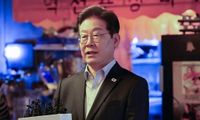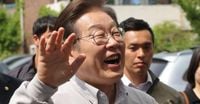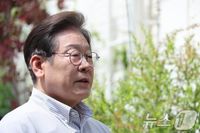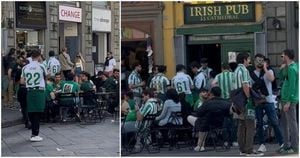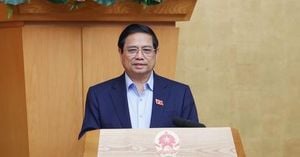On May 7, 2025, Lee Jae-myung, the Democratic Party presidential candidate, expressed his approval of the Seoul High Court's decision to postpone the first hearing of his Public Official Election Act violation case until after the upcoming election. Lee described the court's decision as a "reasonable decision that aligns with the spirit of the constitution." This move has been welcomed by his party, which sees it as a necessary step for ensuring a fair election process.
The Democratic Party swiftly applauded the High Court's ruling, emphasizing that it was the "minimum condition for a fair election." Cho Seung-rae, the chief spokesperson for the party's Central Election Committee, stated that the postponement was a "natural decision" and underscored the importance of maintaining public trust in the electoral process. He further urged the courts to delay all other scheduled trials that could interfere with election campaigning.
In a notable reaction, pro-Lee Jae-myung lawmakers from the Democratic Party have made it clear that they intend to hold Supreme Court Justice Cho Hee-dae accountable for his role in the case. They have expressed their determination to pursue justice against what they perceive as judicial overreach. Yang Moon-seok, a member of the National Assembly, declared on social media that the High Court's decision was a necessary response to the politically charged atmosphere surrounding the case. He stated, "We will hold Cho Hee-dae accountable until the end."
On the same day, the Central District Court set trial dates for the Daejang-dong case, with hearings scheduled for May 13 and May 27, and the first trial for a perjury case set for May 20. Lee's legal team has submitted requests to postpone these trials as well, seeking to ensure that all proceedings are pushed back to after the election.
The Seoul High Court's Criminal Division 7, presided over by Judge Lee Jae-kwon, announced the postponement just one hour after Lee's legal team filed a request for a date change. The court stated that the decision was made to guarantee Lee's equal opportunity for election campaigning and to eliminate concerns about the fairness of the trial. This decision came in the wake of the Supreme Court's prior ruling, which had sent the case back for review with a guilty implication.
Lee's defense team highlighted constitutional provisions, including Article 116, which guarantees equal campaigning opportunities for candidates, and Article 11 of the Public Official Election Act, which prohibits the arrest or detention of candidates during their campaigning period. They argued that the court's decision to postpone the trial is in line with these legal principles.
The Democratic Party's response to the court's decision has been overwhelmingly positive. Yoon Ho-jung, the chief of the party's Central Election Committee, publicly stated that the High Court's decision was a relief and a step towards ensuring a fair electoral process. He called for all trials that could disrupt the election campaign to be postponed.
However, the opposition People Power Party expressed strong disapproval of the postponement. Kwon Seong-dong, the floor leader of the People Power Party, criticized the decision as a capitulation to pressure from Lee's faction. He lamented that the judiciary should resist external influences and maintain its independence, stating, "It is the judiciary's duty to conduct trials without yielding to threats of power."
The political climate surrounding the trial is charged, with accusations from the People Power Party suggesting that the judiciary has succumbed to pressure from Lee's supporters. Kwon described the postponement as the beginning of "Lee Jae-myung's dictatorship," framing the situation as a serious threat to the integrity of the judicial system.
Lee Jae-myung's legal challenges are not limited to the Public Official Election Act case; he faces multiple trials that could significantly impact his presidential campaign. The Daejang-dong case and a perjury case are among the trials that have raised concerns within the Democratic Party about the timing and implications of judicial proceedings leading up to the election.
In anticipation of Lee's potential election, the Democratic Party is proactively pursuing legislative measures aimed at protecting him from legal repercussions should he win the presidency. They have proposed amendments to the Criminal Procedure Act that would suspend ongoing trials if a defendant is elected president. This legislative push has sparked controversy and accusations from the opposition, who argue that it amounts to an attempt to shield Lee from accountability.
The Democratic Party's strategy reflects a broader concern about the potential for judicial proceedings to influence the electoral landscape. Party officials have vowed to continue their efforts to ensure that all trials involving presidential candidates are postponed until after the election, emphasizing the need to uphold democratic principles and the rule of law.
As the political tensions rise, the focus remains on the implications of these legal battles for Lee Jae-myung's presidential ambitions and the integrity of the electoral process. The Democratic Party's commitment to challenging the judiciary's decisions and the People Power Party's accusations of judicial manipulation set the stage for a contentious political landscape leading up to the election.
The unfolding drama surrounding Lee Jae-myung's legal challenges and the responses from both major political parties illustrate the complex interplay between law and politics in South Korea. With the election looming, the stakes are high for all involved, and the outcomes of these trials could have lasting impacts on the country's political future.
